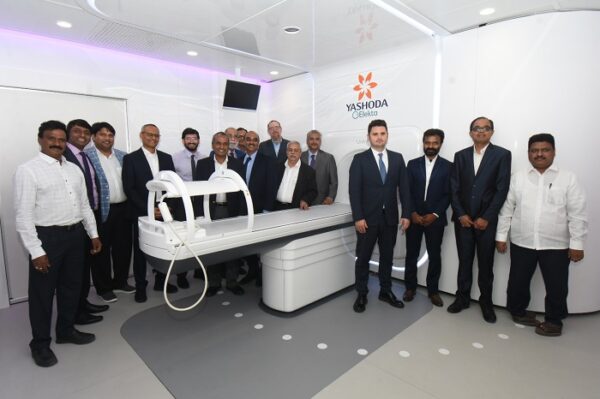Yashoda Hospital, Elekta introduce Unity MR Linac for cancer treatment
Yashoda Hospital, in partnership with Elekta, a Swedish developer of precision radiation therapy, has introduced the latter’s Unity MR Linac system in India, marking a significant leap forward in cancer treatment.
The advanced technology, which combines the precision of magnetic resonance imaging (MRI) with accurate radiation delivery, sets a new standard for radiation therapy. With the Unity MR Linac, Yashoda Hospital becomes the first facility in India to offer patients adaptive radiation therapy that is accurate, precise, and optimises clinical outcomes while minimising toxicity.
Manikandan Bala — Elekta Managing Director India and Senior Vice President Intercontinental said: “We are delighted to bring the state-of-the-art MR Linac, Unity to India.
“This innovative technology represents a significant advancement in cancer treatment and demonstrates our commitment towards improving patient care. We firmly believe that the Elekta Unity MR Linac will propel the field of radiation therapy in India to new heights, resulting in improved treatment outcomes.”
Cancer, the second leading cause of death in India after heart disease, poses a significant health challenge in the country. Between 2018 and 2020, the country recorded more than four million cancer cases and over 2.25 million deaths due to the disease.
As the domain of cancer care is greatly influenced by technology, upskilling, and accessibility, advancements like the Unity MR Linac system are critical in enhancing patient outcomes and overall care quality.
Radiation therapy is an essential part of cancer care, with more than half of all cancer patients requiring it for treatment. Access to radiotherapeutic facilities is crucial, as radiation therapy is considered the most cost-effective form of therapy.
Traditional LINAC systems separate the processes of imaging and radiation delivery. Patients undergo external imaging scans such as CT or MRI, and a treatment plan is crafted based on these images. This method, however, has limitations in visualising tumors and surrounding healthy tissues in detail.
Recognised for its superior imaging of soft tissues compared to CT scans, MRI technology has revolutionised diagnostic radiology. The challenge lay in merging MRI with a linear accelerator for radiation therapy, which was previously deemed technically incompatible.
Elekta’s scientists and engineers, however, have made a revolutionary breakthrough by successfully integrating the power of MRI with a precise linear accelerator into a single unit. This state-of-the-art machine harnesses the capabilities of both MRI technology and a linear accelerator to enable real-time, precise, and accurate radiation therapy.
Dr GS Rao — Yashoda Hospitals Hyderabad Managing Director said: “MR-guided radiation therapy is now being utilized for various conditions, including benign and malignant brain tumors and cancers of Head & Neck, prostate, pancreas, lung, liver and rectum. It’s important to note that the specific applications of this technology are rapidly evolving as its capabilities continue to advance.”
